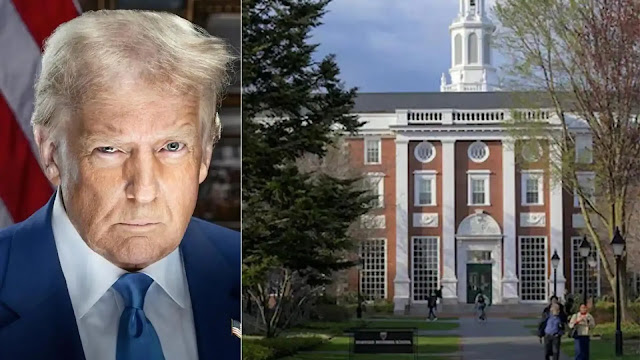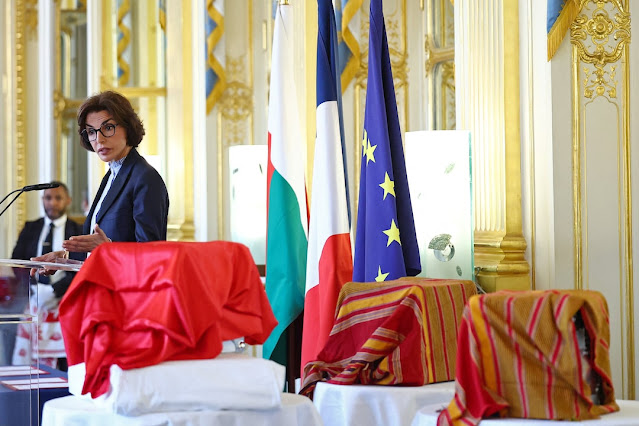Washington, D.C. – August 26, 2025 – In a dramatic escalation of tensions between the White House and America’s elite academic institutions, U.S. President Donald Trump has demanded that Harvard University pay a $500 million settlement to restore billions of dollars in frozen federal funding, accusing the Ivy League giant of misconduct. The bold directive, issued during a Cabinet meeting on Tuesday, August 26, 2025, marks a pivotal moment in a months-long standoff that has pitted the nation’s wealthiest university against an administration intent on reshaping higher education. Trump’s remarks, delivered with characteristic bluntness, signal a hardline stance in a dispute that has far-reaching implications for academic freedom, federal oversight, and the political dynamics of American universities.
“We want nothing less than $500 million from Harvard. Don’t negotiate, Linda,” Trump told Education Secretary Linda McMahon during the Cabinet meeting, referring to the former wrestling executive who has spearheaded the administration’s crackdown on universities. Moments later, he doubled down, declaring, “They’ve been very bad. Don’t negotiate.” The comments, broadcast live and widely shared on social media platforms like X, underscore Trump’s personal investment in the feud, which centers on allegations of antisemitism on Harvard’s campus and broader claims of ideological bias in elite academia.
Harvard, the only university to directly challenge the Trump administration in court, has become the epicenter of a broader clash over federal funding, academic freedom, and political speech. The university is locked in a legal battle with the administration, which has frozen over $2.6 billion in research grants and contracts, citing Harvard’s alleged failure to address antisemitism amid the ongoing Israel-Hamas war. As a federal judge prepares to rule on the case, the dispute has sparked intense debate about the government’s role in regulating higher education and the extent to which political agendas are shaping academic policy.
The Genesis of the Conflict
The roots of the Trump administration’s confrontation with Harvard trace back to early 2025, when the White House launched a sweeping campaign targeting elite universities it accused of fostering antisemitism and promoting liberal ideologies. The initiative, led by Education Secretary McMahon, began with investigations into campus responses to pro-Palestinian protests sparked by the Israel-Hamas war, which began in October 2023 and has claimed tens of thousands of lives, according to Palestinian authorities. The administration argued that universities like Harvard failed to protect Jewish students from harassment and allowed divisive political activism to flourish unchecked.
In February 2025, the Trump administration escalated its approach by freezing federal research funding to several Ivy League institutions, including Harvard, Columbia, and Brown. For Harvard, the richest U.S. university with an endowment valued at $53 billion, the cuts were particularly severe, totaling over $2.6 billion in research grants and contracts. The administration also attempted to block Harvard from enrolling international students, a move that was partially halted by a federal judge’s preliminary injunction in May 2025. These actions, described by critics as punitive and politically motivated, prompted Harvard to file two lawsuits against the administration, challenging the funding freeze and the international student ban as violations of due process and academic freedom.
The legal battle has positioned Harvard as the most prominent holdout among elite universities targeted by the administration. While Columbia University agreed to a $221 million settlement in July 2025 to restore its funding, and Brown University settled for $50 million in August, Harvard has refused to capitulate, arguing that any deal compromising its autonomy would set a dangerous precedent for higher education. The university’s defiance has made it a lightning rod for Trump’s ire, with the president frequently singling it out as a symbol of liberal elitism.
Trump’s $500 Million Demand
Trump’s demand for a $500 million settlement, articulated during the August 26 Cabinet meeting, represents the administration’s most aggressive financial ultimatum to date. The figure, more than double Columbia’s settlement and ten times Brown’s, reflects the administration’s determination to extract a significant penalty from Harvard, which it views as the flagship of American higher education. The demand also aligns with Trump’s broader political strategy of targeting institutions he perceives as ideologically opposed to his agenda, a tactic that resonates with his political base.
According to sources familiar with the administration’s thinking, as reported by The New York Times and PBS News, the $500 million figure was chosen to send a message to other universities and to demonstrate Trump’s deal-making prowess. “A deal would allow Mr. Trump to claim that Harvard forked over $500 million amid pressure from him,” noted a Times report, citing four people familiar with the negotiations. For Harvard, the settlement would restore access to billions in federal funding critical to its research programs, which span medicine, technology, and social sciences, and preserve its status as a global academic powerhouse.
The administration’s focus on financial penalties marks a shift from its initial emphasis on ideological reforms, such as demanding changes to university admissions policies or curriculum content. Early in the dispute, the White House tied funding cuts to accusations of antisemitism and diversity, equity, and inclusion (DEI) policies, which it claimed fostered division on campuses. However, as negotiations with other universities progressed, financial settlements emerged as a key tool for resolving disputes, with Columbia and Brown agreeing to pay substantial sums to regain funding access.
Harvard’s response to the $500 million demand has been cautious but resolute. The university declined to comment directly on Trump’s remarks, but President Alan Garber, who has led Harvard since January 2025, has consistently emphasized the institution’s commitment to academic freedom. In an April 2025 statement, Garber declared, “No government—regardless of which party is in power—should dictate what private universities can teach, whom they can admit and hire, and which areas of study and inquiry they can pursue.” This stance has been echoed by faculty and alumni, who have warned that capitulating to the administration’s demands could erode Harvard’s independence and set a precedent for government overreach into academia.
The Legal Battle: Harvard vs. the Trump Administration
Harvard’s legal challenge, filed in April 2025 in the U.S. District Court in Boston, is at the heart of the current standoff. The university’s lawsuits argue that the Trump administration’s funding cuts and international student restrictions are retaliatory and unconstitutional, violating due process and First Amendment protections. Harvard contends that the administration’s actions are driven by political motives rather than evidence of wrongdoing, pointing to the lack of specific findings tying the funding freeze to antisemitism violations.
U.S. District Judge Allison Burroughs, who is presiding over the case, has expressed skepticism about the administration’s tactics. During a hearing on August 18, 2025, Burroughs questioned the legality of tying research funding to allegations of antisemitism, describing the government’s approach as raising “staggering” due process concerns. Her remarks, reported by The New York Times, suggest that Harvard may have a strong case, though the administration has vowed to appeal any unfavorable rulings. Harvard has requested an expedited decision by September 3, 2025, citing the need to submit critical grant paperwork to avoid disruptions to research programs that employ thousands of faculty and students.
The legal battle has drawn significant attention, with more than a dozen Democratic members of Congress, all Harvard alumni, issuing a letter on August 1, 2025, warning the university against settling with the administration. The letter, reported by PBS News, cautioned that capitulating to political demands could invite “rigorous Congressional oversight and inquiry” and set a dangerous precedent for higher education. “A settlement with the Trump administration will have a chilling effect on the Harvard community and on all of higher education,” stated a separate petition signed by over 14,000 Harvard alumni, students, faculty, and supporters, organized by the group Crimson Courage.
Political Motivations and Public Sentiment
Within the Trump administration, targeting elite universities like Harvard is seen as a politically potent strategy. Sources within the White House, as reported by Reuters and CNN, indicate that officials believe the campaign resonates with a conservative base frustrated by what they perceive as liberal dominance in academia. Trump has long criticized elite universities as “Marxist” and “woke,” accusing them of indoctrinating students and stifling conservative viewpoints. His focus on Harvard, the nation’s oldest and wealthiest university, aligns with his broader narrative of challenging establishment institutions.
Public sentiment, as reflected on platforms like X, is deeply divided. Supporters of Trump’s approach, such as @RodDMartin, have praised the administration for holding universities accountable, citing Harvard’s alleged failure to address antisemitism and its DEI practices. “Trump already showed he’s serious: Fined Harvard, Columbia & others hundreds of millions for illegal DEI practices,” Martin posted on August 14, 2025. Conversely, critics like @GavinNewsom, the California governor, have condemned Harvard’s potential settlement as a “surrender” to political pressure, calling for President Garber’s resignation. “You don’t work with Donald Trump—only FOR Donald Trump,” Newsom posted on August 12, 2025.
The controversy has also reignited debates about antisemitism on college campuses. The Israel-Hamas war, which has fueled protests and counterprotests across the U.S., has heightened scrutiny of how universities handle allegations of harassment and discrimination. Harvard has faced particular criticism following a 2023 incident in which then-President Claudine Gay declined to explicitly condemn calls for the genocide of Jews as a violation of university policy, a moment that galvanized conservative critics and led to her resignation in January 2025. The administration has pointed to such incidents as evidence of Harvard’s failure to protect Jewish students, though the university denies systemic antisemitism and has implemented measures to address campus tensions.
Settlements with Other Universities
The Trump administration’s success in securing settlements with Columbia and Brown Universities has intensified pressure on Harvard to follow suit. Columbia agreed to pay $200 million over three years to the U.S. Treasury, plus an additional $21 million to resolve Equal Employment Opportunity Commission investigations, in exchange for restoring $400 million in frozen funding. The agreement, finalized in July 2025, also included provisions for an independent monitor to oversee compliance and a review of regional studies programs, measures critics argue infringe on academic autonomy.
Brown University, in contrast, struck a $50 million deal in August 2025, directing funds to workforce development programs in Rhode Island over a decade. The agreement avoided external oversight and preserved Brown’s control over its curriculum, a point of contention in Harvard’s negotiations. Harvard officials, according to The New York Times, were “stunned” by Brown’s relatively lenient terms, prompting internal debates about whether to accept a $500 million settlement or continue fighting in court.
These settlements have established a playbook for the administration’s negotiations with universities, combining financial penalties with policy concessions. However, Harvard’s unique position as the only institution to challenge the administration in court has complicated its negotiations. The university’s reluctance to agree to external oversight, such as an independent monitor, and its insistence on protecting academic freedom have been sticking points, as reported by The Harvard Crimson and Reuters.
The Stakes for Harvard and Higher Education
For Harvard, the stakes could not be higher. The university relies on federal funding for a significant portion of its research budget, which supports groundbreaking work in fields like cancer research, artificial intelligence, and climate science. The loss of $2.6 billion in grants and contracts threatens to disrupt thousands of projects and jeopardize the livelihoods of faculty, researchers, and students. Harvard’s lawsuit argues that the funding freeze not only harms the university but also undermines national interests by halting research deemed high-priority by the federal government.
The broader implications for higher education are equally profound. A settlement with the Trump administration could embolden further government intervention in university operations, potentially affecting admissions policies, curriculum content, and faculty hiring. Critics, including Harvard faculty and Democratic lawmakers, warn that such concessions could erode the independence of private institutions and set a precedent for political interference in academia. “Capitulating to political demands would set a dangerous precedent across all of higher education,” the Congressional letter stated, echoing concerns raised by First Amendment defenders and academic associations.
Conversely, a victory for Harvard in court could limit the government’s ability to use funding as leverage against universities, reinforcing the principle of academic freedom. Legal experts, such as Nobel Prize-winning economist Oliver Hart, have advised Harvard to secure clear terms in any settlement to prevent the administration from altering conditions post-agreement. “I would spell out what happens if a party feels the agreement is not being honored,” Hart told The New York Times in July 2025, emphasizing the need for robust legal protections.
The Road Ahead
As Judge Burroughs prepares to issue a ruling in Harvard’s funding case, the university faces a critical juncture. A decision in its favor could restore funding and bolster its legal challenge, but an adverse ruling—or a prolonged appeals process—could force Harvard to reconsider a settlement. The September 3 deadline for grant paperwork adds urgency to the situation, as delays could disrupt research programs and damage Harvard’s global reputation.
For the Trump administration, the Harvard dispute is a high-profile test of its higher education agenda. A successful settlement would reinforce Trump’s image as a dealmaker capable of bending elite institutions to his will, a narrative that resonates with his supporters. However, a legal defeat could undermine the administration’s strategy and embolden other universities to resist similar pressure.
The controversy has also sparked broader questions about the role of federal funding in higher education. Universities like Harvard rely on government grants to drive innovation, but the Trump administration’s actions highlight the vulnerabilities of this dependence. Some analysts argue that elite institutions should diversify their funding sources to reduce exposure to political fluctuations, while others see the dispute as a call for stronger legal protections for academic institutions.
Public and Political Fallout
The public reaction to Trump’s $500 million demand has been polarized, reflecting the broader cultural and political divides in the U.S. On X, supporters of the administration have celebrated the move as a necessary correction to perceived liberal bias in academia, while critics have decried it as an attack on intellectual freedom. Posts like those from @OccupyDemocrats, which celebrated a recent judicial setback for the administration’s funding cuts to UCLA, suggest growing resistance to Trump’s tactics among progressive groups.
Politically, the dispute has galvanized both sides of the aisle. Republicans, including Education Secretary McMahon, have framed the campaign as a defense of “truth-seeking, merit, and civil debate,” as McMahon stated in a July 2025 press release. Democrats, meanwhile, have accused the administration of weaponizing federal funding to suppress dissent and advance a conservative agenda. The involvement of high-profile figures like Newsom and the Congressional Harvard alumni underscores the dispute’s significance as a battleground in the culture wars.
Conclusion
President Trump’s demand for a $500 million settlement from Harvard University represents a defining moment in the ongoing clash between the White House and America’s elite academic institutions. Rooted in allegations of antisemitism and ideological bias, the dispute has evolved into a broader struggle over the future of higher education, academic freedom, and the role of government in shaping university policies. Harvard’s defiance, embodied in its legal challenge and refusal to compromise its autonomy, has made it a symbol of resistance, while the Trump administration’s hardline stance reflects its determination to reshape academia in its image.
As the legal battle unfolds and a federal judge prepares to rule, the outcome will reverberate far beyond Cambridge, Massachusetts. A settlement could reshape the relationship between universities and the federal government, while a court victory for Harvard could reinforce the sanctity of academic independence. For now, the standoff remains a high-stakes showdown, with billions in funding, the future of higher education, and the legacy of one of America’s most iconic institutions hanging in the balance.





